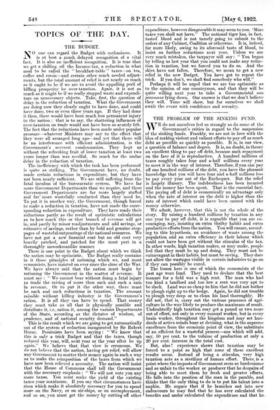TOPICS OE 'THE DAY.
THE BUDGET. N0 one can regard. the. Budget with enthusiasm. It is at beat a .much delayed recognition of a vital fact. It is also an inefficient recognition. It is true that we get a shilling off the Income-tax, a reduction in what used to be called the " breakfast-table " taxes—on tea, coffee and cocoa—and certain other much needed adjust- ments, but the total amount of relief is not nearly so much as it ought to be if we are to avoid the appalling peril of killing prosperity by over-taxation. Again, it is not as much as it might be if we really stopped waste and expendi- ture on unnecessary objects. Take, first, the question of delay in the reduction of taxation. What the Government are doing now they clearly ought to have done, and could have done, two or even three years ago. If they had done it then, there would have been much less permanent injury to the nation ; that is to say, the shattering influences of over-taxation on trade would not have been so acutely felt. The fact that the reductions have been made under popular pressure—whatever Ministers may say to the effect that they were all arranged long ago—and yet that there will be no interference with efficient administration, is the Government's severest condemnation. They kept us without the refreshing fruit of lower taxation at least two years longer than was needful. So much for the undue delay in the reduction of taxation. The inefficiency with which the task has been performed is quite as striking. The Government have, no doubt, made certain reductions in expenditure, but they have not been nearly sufficient. We are still suffering from the fatal incubus of the bureaucratic system. We have far more Government Departments than we require, and these Government Departments are far more largely staffed and far- more wastefully conducted than they need be. To put it in another way, the Government, though forced to make a reduction in taxation, have not made the corre- sponding reduction in expenditure. They have made their reductions partly as the result of optimistic calculations as to how much this or that branch of revenue will get in, and partly by minor readjustments and odd savings, or estimates of savings, rather than by bold and genuine stop- pages of wastefuloutpourings of the national resources. We have not got a new financial coat but an old coat very heavily patched, and patched for the most part in a thoroughly unworkmanlike manner. There is one point in the Budget about which we think the nation may be optimistic. The Budget really contains in it those principles of rationing which we, and most economists, have insisted on ever since the close of the War. We have always said that the nation must begin by rationing the Government in the matter of revenue. It must say : " We cannot bear without doing a fatal injury to trade the raising of more than such and such a sum in revenue. Or to put it the other way, there must be such and, such reductions in taxation. The amount raisable without killing industry is the Government's ration. It is all they can have to spend. That money they must take as all that is physically possible and distribute it, i.e., ration it, among the various Departments of the State, according as the dictates of wisdom, of prudence, and of national security demand." This is the result which we are going to get automatically out of the system of reduction inaugurated by Sir Robert Home. Pessimists have been saying : " We know that this is only a trick Budget and that the taxes, though reduced this year, will, next year or the year after be up Again." We believe that that view is erroneous. We do not believe that the nation, having got relief, will allow any Government to scatter their money again in such a way as to make the reimposition of the taxes from which we have now been relieved a necessity. The nation will insist that the House of Commons shall tell the Government with the necessary emphasis : " We will not vote you any more taxes. You must make the yield of the existing taxes your maximum. If you say that circumstances have risen which make it absolutely necessary for you to spend more on the Navy, or on air-ships, or on unemployment, and so on, you must get the money by cutting off other expenditure, however disagreeable it may seem to you. INfore taxes you shall not have." The national tiger has, in fact, tasted blood and is not tamely going to submit to the orders of any Cabinet, Coalition or otherwise. It is, indeed, far more likely, owing to its aforesaid taste of blood, to insist on further reductions next year. Unless we are very much mistaken, the taxpayer will say " You began by telling us last year that you could not make any reduc- tion in taxation, but we forced you to 'do so. And the skies have not fallen. Therefore, we mean to get a new relief in the new Budget. You have got to repeat the trick. If you don't, we shall find somebody who will." Perhaps it will be urged that we are too optimistic as to the opinion of our countrymen, and that they will be quite willing next year to take a Governmental non possuntus lying down. Our answer is that we don't believe they will. Time will show, but for ourselves we shall await the event with confidence and serenity.


































 Previous page
Previous page